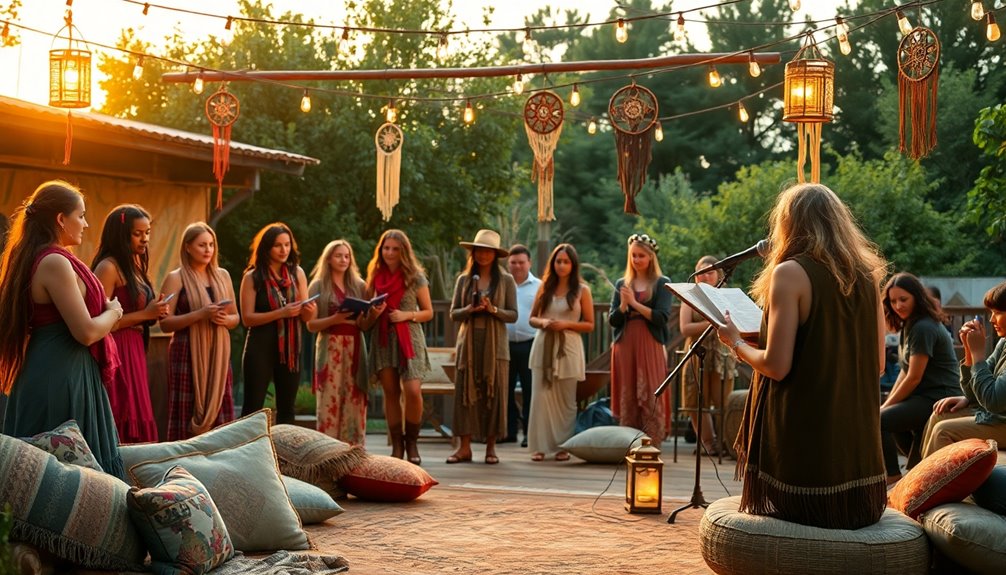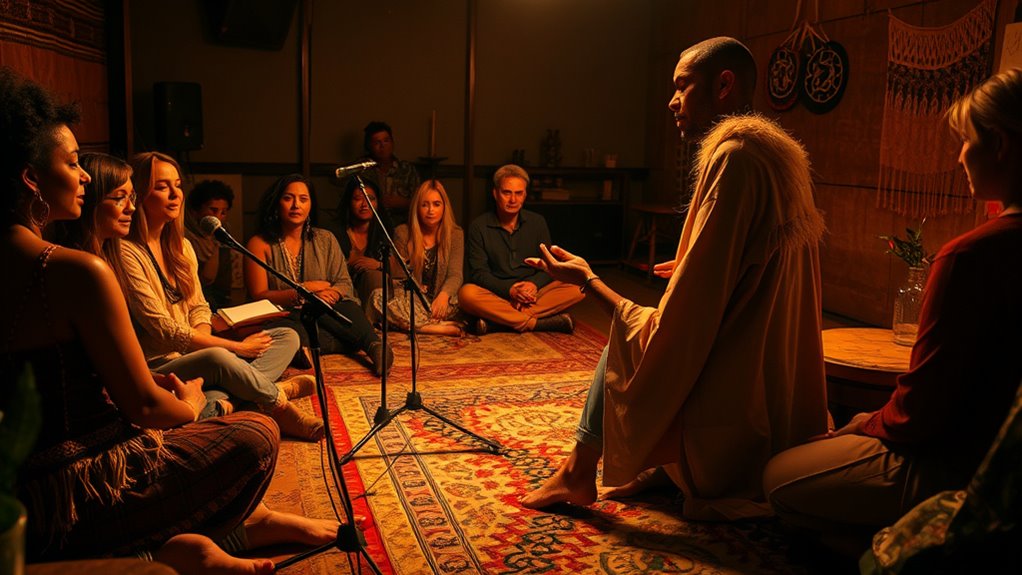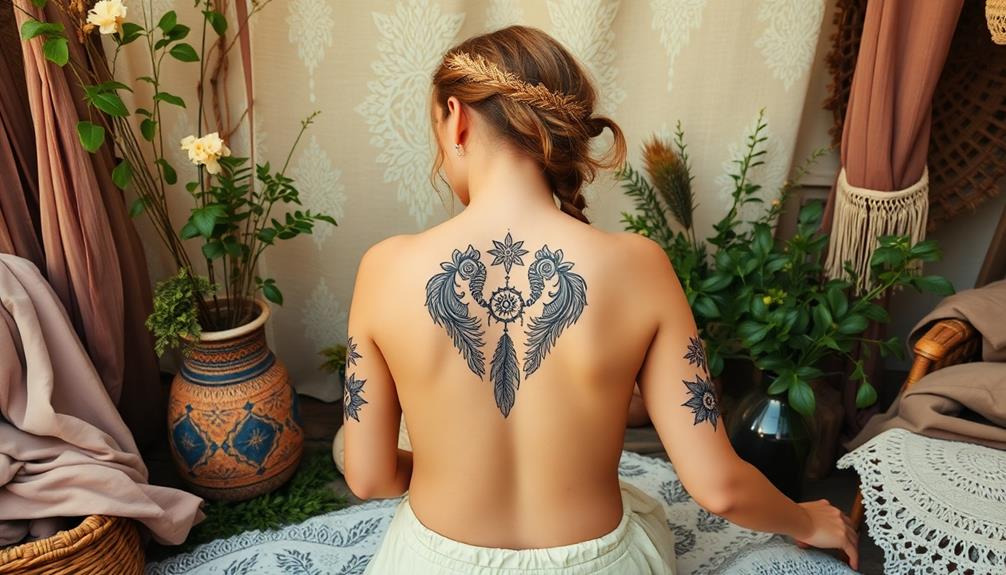Boho poetry and spoken word are about expressing your authentic self through free-spirited, raw art forms. You’ll connect deeply by using vivid imagery, improvisation, and emotional honesty in your performance. Embrace imperfections and let your voice fluctuate naturally to create a genuine, intimate experience. This style celebrates personal journeys and natural themes like resilience and self-discovery. If you keep exploring, you’ll uncover how to channel your unique voice into powerful, spontaneous art.
Key Takeaways
- Boho poetry emphasizes free-spirited, expressive language blending poetic techniques with performance art.
- Spoken word in boho style incorporates improvisation, vocal fluctuation, and emotional authenticity.
- Themes often explore nature, identity, resilience, and self-discovery through vivid imagery.
- Authenticity and personal quirks are celebrated, creating intimate, impactful performances.
- Daily self-exploration and improvisation foster emotional freedom and genuine artistic expression.

If you’re drawn to expressive, free-spirited art forms, boho poetry and spoken word offer a vibrant space to explore personal emotion and creativity. Every day, you can tap into this genre to channel your innermost thoughts and feelings.
Embrace your inner voice daily through expressive boho poetry and spoken word, connecting deeply with your authentic self.
The style thrives on raw, unfiltered language that emphasizes authenticity, encouraging you to speak your truth without hesitation. By embracing this approach, you’re not just reciting lines—you’re sharing a piece of yourself, connecting deeply with your audience through vulnerability and honesty.
In boho poetry and spoken word, your words become more than just words; they’re expressions of your soul. The style often combines poetic techniques with performance, making each session more than just reading—it’s an act of living art.
The emphasis on performance means you’re encouraged to let your voice fluctuate, improvise, and spontaneously vocalize, which heightens the emotional impact. Every day, you have the chance to experiment with different dialects, tones, and rhythms, adding authenticity and playfulness to your delivery.
This fluidity allows you to convey complex themes like resilience, emotional freedom, and connection with nature in a way that feels genuine and relatable. Incorporating performance techniques can elevate your expressive power and deepen audience engagement.
Themes like nature and individual identity are central to boho spoken word. You might craft vivid imagery or playful metaphors that evoke the natural world or explore your personal journey toward self-discovery.
The genre celebrates your unique voice, urging you to embrace your quirks and imperfections. When you perform, every spontaneous vocalization or improvisation becomes an extension of your inner reflection, making each piece uniquely yours.
This emphasis on personal authenticity creates an intimate experience not only for you but also for those listening, as they witness your genuine expression unfold in real time.
Practicing boho poetry and spoken word every day encourages you to view your art as a ritual of self-exploration. It invites you to embrace emotional freedom and develop resilience through creative expression.
When you let your voice and words flow freely, you forge a deeper connection with yourself and your surroundings. By incorporating improvisation and spontaneous elements, you keep your performances fresh and compelling, never bound by strict rules.
This genre is about embracing your individuality, celebrating your story, and sharing your truth—every day, you have the power to turn your feelings into impactful art that resonates with others.
Frequently Asked Questions
What Is Spoken Word Poetry Called?
When you ask what spoken word poetry is called, it’s often referred to as performance poetry because it focuses on live, oral delivery.
People also call it slam poetry when performed competitively at poetry slams, emphasizing energetic performances.
Other terms include poetry performance, oral poetry, or theater poetry, highlighting its expressive and theatrical nature.
These names all reflect the dynamic, spoken aspect that makes this art form unique.
What Is the Style of Spoken Word Poetry?
Imagine a river flowing freely, shaping its own path—that’s the style of spoken word poetry. You perform with passion and emotion, using free verse to explore social issues, personal stories, and cultural identity.
Your voice varies in tone, volume, and pacing, making your words come alive. You connect directly with your audience through conversational language, gestures, and rhythm, creating an engaging, dynamic experience that provokes thought and stirs feelings.
What Is the Difference Between Spoken Word and Poetry?
You wonder about the difference between spoken word and poetry. Spoken word is a performance art that emphasizes vocal delivery, gestures, and audience interaction, often addressing social, political, or personal themes with energy and raw emotion.
Poetry, on the other hand, is written text that can be enjoyed through reading or listening. While all spoken word is poetry, not all poetry is performed as spoken word.
What Is the Spoken Word Poetry Tradition?
You’re asking about the spoken word poetry tradition. It’s all about performance, oral storytelling, and emotional expression rather than just written words.
Originating from African-American oral traditions, it became a platform for activism and cultural voice.
You’ll see it at poetry slams and open mics, where the focus is on authenticity, social commentary, and engaging your audience through rhythmic delivery, storytelling, and powerful messages.
Conclusion
You might be surprised to learn that over 60% of spoken word audiences feel more connected to performers who embrace a boho style. This vibrant, free-spirited approach not only sparks creativity but also fosters genuine emotion. When you immerse yourself in boho poetry, you’re part of a movement that values authenticity and expression. So, keep listening and sharing—your voice has the power to inspire and unite through the soulful energy of spoken word.










